
Dental Implants – Springfield, MO
Achieve Long-Term Benefits
Through Full-Tooth Replacement
While there are multiple solutions to replace the visible portions of teeth, only one treatment effectively replaces the entire structure of your teeth: dental implants. This procedure is designed to replace the root structure as well as the crown portion of the tooth that’s visible in your smile. With Dr. Eric Tolliver’s expertise, you can have the entire treatment performed in-house. Thanks to the comprehensive nature of dental implants, you can easily replace both single teeth and all the teeth in your smile. Call our dental office today to schedule your very first consultation!
Why Choose Galleria Dental of Springfield for Dental Implants?
- Start-to-Finish Implant Treatment In-Office
- Replace An Entire Arch of Teeth With All-On-4
- Seamless Quality That Lasts For Decades
The 4-Step Dental Implant Process

Because of their more complex structure, dental implant treatment takes longer than that of regular bridges or dentures. Once your new teeth are in place, though, you’ll soon find that they’re absolutely worth the wait! Luckily, Dr. Eric Tolliver is a highly skilled implant dentist, so he can conveniently perform all four major steps of the dental implant process right here in our dental office.
Initial Dental Implant Consultation

Dental implants require a great deal of planning in order to maximize the chances of successful treatment. For that reason, a consultation with Dr. Tolliver is always the first step in the process. He’ll perform a detailed examination of your mouth and take high-resolution X-rays of your jawbone and other oral structures to determine whether you’re eligible for implant surgery right away or whether you’ll need bone grafting, tooth extractions, or some other procedure first. You’ll also have an opportunity to ask Dr. Tolliver any questions you might have about how dental implants work.
Dental Implant Surgery

Most patients are pleasantly surprised by how comfortable and straightforward dental implant surgery actually is. We’ll make sure that your mouth is completely numb and that you’re relaxed before proceeding. When you’re ready, Dr. Tolliver will make tiny incisions in your gums through which he can access your jawbone. Then, he’ll carefully place the implant posts at specific locations and angles in the bone before stitching your gums closed. As the bone and tissue begin to heal, he might place a temporary restoration on top of the implants.
Dental Implant Osseointegration & Abutment

Once the implants have been placed into your jaw, they begin the process of osseointegration – fusing to the surrounding bone and tissue – which creates a stable foundation for your future crown, bridge, or denture. Depending on your circumstances, osseointegration can take anywhere from three to six months, so it’s important to follow Dr. Tolliver’s aftercare guidelines.
When this process is complete, you’ll come back to our dental office to have your abutments placed. Abutments are small metal connectors that allow your restorations to actually be attached to your dental implants. This procedure involves reopening your gum tissue, installing the abutments, and closing the gums around the abutment.
Delivery of Dental Implant Restoration(s)

You’ll need a couple of weeks to recover after abutment placement. Once it’s done, though, you can look forward to finally receiving your restorations! We’ll place a crown, bridge, or denture that has been customized to complement your facial features and resemble your natural teeth. In the end, your new smile will look and feel indistinguishable from your old one!
Benefits of Dental Implants

When you replace the root structure of your dental implant and not just the crown, you’re able to restore many of your mouth’s most common functions. For example, once the titanium post that makes up your replacement root is integrated with your bone tissue, you can expect your biting force to be fully recovered. This new integration is exactly why you’ll be able to eat the foods you want, even if they are tough or chewy. Only dental implants give you the ability to eat steak, apples, nuts, and other foods confidently.
Additionally, dental implants offer true long-term success that you won’t get from other methods of tooth replacement. With proper care, you can expect your dental implants to last at least 25 years without concern. In most cases, they last the rest of the patient’s life. If you want the most natural-looking solution for tooth loss, no other procedure comes close!
Are Dental Implants Right For Me?

If you are missing single, multiple, or all the teeth in your smile, you’ll find dental implants to be an incredibly effective solution. Learn how we can restore your smile to the fullest with the following treatments!
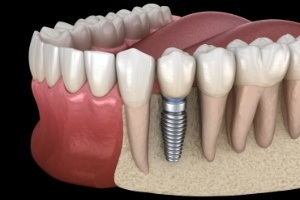
Missing One Tooth
Replacing a single tooth requires one titanium post, an abutment, and a porcelain crown that’s affixed on top. The implant post is placed directly into the jaw and designed to integrate with your bone and gum tissue. Once it’s healed, an abutment is placed on top, which acts as a connector for your eventual porcelain crown.
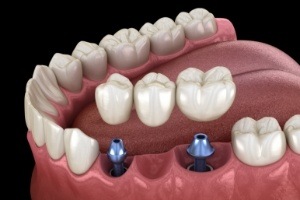
Missing Multiple Teeth
To replace multiple missing teeth, a pair of dental implants can be placed to hold a larger bridge. Instead of relying on neighboring teeth to keep the restoration in place, the implants do all of the heavy lifting. This means you can maintain more of your natural tooth enamel and replace multiple consecutive teeth at the same time.
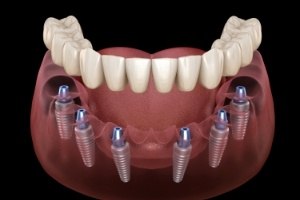
Missing All of Your Teeth
If you have missing teeth on opposite sides of your mouth or you’ve lost all the teeth in a given arch, dental implants can be customized to fit with full dentures. With four to six implants, you can create a foundation for your permanent restoration and save on treatment costs in the process.
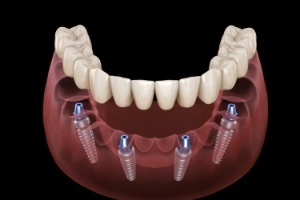
All-on-4/Teeth-in-a-Day
With the All-on-4 dental implant treatment, you can restore all the teeth in a given arch with just four implants! Each implant is placed strategically throughout the mouth in order to maximize the amount of bone available in the jaw. This allows us to place your implants and your permanent restoration on the same day!
Understanding the Cost of Dental Implants
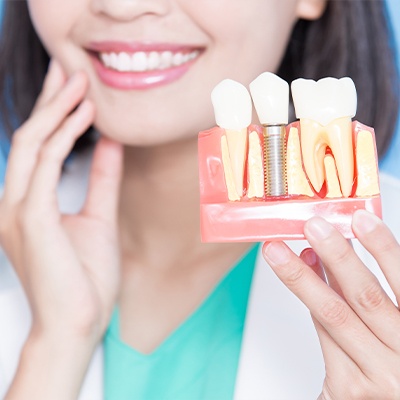
The versatility of dental implants means that the cost for the treatment is not set in stone. Some patients only need one tooth replaced while others are missing an entire arch; some will need a bone graft to be performed before implant placement while others might have gum disease that needs to be treated before the process can even begin. Our team will discuss the various relevant factors with you and help you determine the best way to pay for implants within your budget.
Preliminary Treatments & Dental Implant Surgery

Some examples of preliminary treatments that might have to be performed before dental implant surgery include gum disease therapy, tooth extractions, and bone grafting. While these procedures will increase the overall cost of the implant process, they are often a necessary step for preventing implant failure, and you can usually expect insurance to help pay for them.
Naturally, implant surgery comes with its own costs. The location of the surgical site and the use of specific forms of dental sedation can affect the cost as well. Note that at Galleria Dental of Springfield, you can enjoy the advantage of having the entire implant process completed under one roof, so there won’t be a bill from a separate dental office to worry about.
The Parts of Your Dental Implant

The dental implants themselves can affect the final cost in several ways. Relevant factors include:
- Number of Implants: One implant can replace a single tooth. Two implants can replace several teeth in a row, and 4 or more can replace an entire row of teeth at once. The more implants used, the higher the final cost.
- Type of Restorations: Implants can support crowns, bridges, and dentures. Smaller restorations tend to be less costly.
- Material: Most implants are made of titanium, but some are made of zirconia, and the difference will be reflected in the final cost.
- Brand: We will select a brand of dental implant that best meets your specific health needs. The cost can vary based on the manufacturer we select.
How Dental Implants Can Save You Money

While you might think that getting regular dentures or bridges instead of implants will save you money, you need to think about the long term. Traditional tooth replacement options will need to be replaced every 5 to 10 years; implants are more cost effective in that they can last a lifetime. They are also extremely easy to take care of, making it easier to avoid oral health issues that could potentially require costly care.
Does My Dental Insurance Cover Dental Implants?

Our team can go over your benefits with you to see what sort of coverage you can expect for dental implants. Usually, there won’t be any coverage for the implant posts themselves, but parts of the final restoration or preliminary treatments might fall under the scope of your insurance plan.
Making Dental Implants Affordable

Talk to our team about CareCredit financing plans. You can apply for low-to-no-interest financing that allows to pay for care in smaller monthly installments, making implant surgery and related treatments much easier on your bank account.
Dental Implant Failure & Salvage
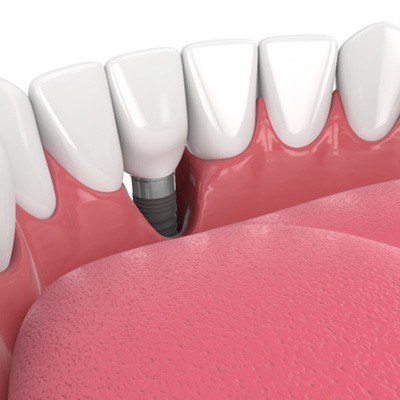
The success rate for dental implants is 95%, and while this definitely makes them an extremely reliable choice, it is still short of 100%. We’re prepared to help if your implants happen to fail. All you need to do is call our office to schedule an appointment and let us know what kinds of symptoms you’ve noticed; once you get to our practice, we can check your smile to see what the problem is and determine what treatments will allow you to reclaim your oral health (and keep your implants when possible).
Learn MoreDental Implant Post-Op Instructions

While most other dental offices need to refer their patients to an outside specialist for dental implant placement surgery, Dr. Tolliver is pleased to perform every step of the treatment phase right here in our dental office for the convenience of our patients. We’ll give you specific, personalized instructions for how to handle all aspects of the post-surgery recovery process and answer all your questions. Below you’ll find some key information that you’ll need to know about caring for your smile after dental implant surgery.
What to Do Directly After Dental Implant Surgery

It’s not uncommon to feel tired after dental implant surgery, so you should plan to take it easy for the rest of the day. You may only need a day or two of rest before feeling recovered enough to go back to school or work, but it’s also normal to need upwards of a week as well. Here are some basic rules to remember the first few days following your dental implant surgery:
- Take your pain medications as instructed. Typically you’ll take your first dose before the effects of the anesthesia from your surgery have fully worn off.
- Stay hydrated with the proper methods. Drinking plenty of water will help the healing process go faster, but be sure to avoid using a straw or spitting forcefully.
- Let the surgical site be: Avoid touching the surgical site with your fingers, tongue, or anything else.
- Practice great oral hygiene: Brush and floss regularly to prevent infection, but avoid mouthwashes that contain alcohol.
Common Side-Effects When Recovering from Dental Implant Placement

If you’ve never had oral surgery before, you may be unfamiliar with what side effects to expect. During the first week or two after your dental implant surgery, it’s normal to experience some slight bleeding, swelling, and discomfort around the surgical site. To manage your symptoms, stay hydrated, apply a cold compress, use gentle pressure, and take over-the-counter pain relievers as directed. If your symptoms don’t show signs of improvement, don’t hesitate to give us a call right away so we can help.
Your Diet After Dental Implant Surgery

Naturally, you’ll need to be careful with what you eat after dental implant surgery. We recommend sticking to a diet of soft, nutritious foods to prevent irritation and help the healing process go smoothly. A few popular choices include:
- Smoothies, frozen yogurt, and ice cream
- Applesauce and yogurt
- Pasta and mashed potatoes
- Cottage cheese, scrambled eggs, and jello
Post-Op Health & Oral Hygiene

Practicing great oral hygiene after your dental implant surgery is key for preventing infection and failure. However, at the same time, it’s important that you do so carefully to avoid disturbing the surgical site. A few tips to keep in mind include:
- Continue to brush for at least two minutes twice a day starting the day after your dental implant surgery, but be very gentle around the surgical site.
- Rinse your mouth out regularly with water, saltwater, or mouthwash, but do not spit forcefully or use a mouthwash that contains alcohol.
What to Do After Your New Teeth Are Attached

Overall, patients typically only need a week or so to recover from dental implant surgery. However, your jawbone will continue to heal for several months as the dental implant integrates with it. When we receive your custom restoration, we’ll call you back into our dental office to have your new teeth attached. You may experience some slight sensitivity in your gums at first, but that should go away very quickly as you enjoy your brand-new smile.
Maintaining & Caring for Your Dental Implant

Dental implants have the potential to keep your smile strong and healthy for a lifetime. However, that’s only the case if you take proper care of them. Failing to protect your newly rebuilt grin from damage and infection may cause them to fail earlier than expected. Luckily, taking the right steps will allow you to keep your implants firmly in place for the rest of your life! Click on the button below to learn which simple precautions you should follow.
Make Oral Hygiene a Priority

Even though dental implants aren’t made from any organic materials, they still require the same level of attention as your teeth. That’s because the gum tissue surrounding the implant can still become inflamed due to plaque and bacteria buildup. If you want to keep your mouth healthy, you need to stay on top of your oral hygiene routine. Brushing twice a day, flossing daily, and rinsing every day with an ADA-approved mouthwash will help you maintain optimal oral health.
Eat a Healthy Diet

Once you’re all healed up, you can eat almost any food you want! However, you want to stick to a balanced diet complete with fruits, vegetables, lean proteins, and whole grains. Eating foods particularly rich in calcium and vitamin C will keep your jawbone strong and gum tissues healthy. Don’t forget to stay hydrated! Drinking plenty of water will help keep your mouth clean and loosen food debris.
Break Bad Habits

While dental implants are certainly durable, they’re not indestructible. To keep them safe, you steer clear of poor habits (i.e., biting fingernails, using teeth as tools, chewing on hard objects). Otherwise, you may damage your restorations.
Protect Your Dental Implants

If you regularly play sports, you should ask Dr. Tolliver about getting a custom-made athletic mouthguard. It’ll help protect your dental implants during contact sports like soccer, basketball, wrestling, hockey, and more. Similarly, you should inquire about a nightguard if you grind your teeth at night. The oral appliance will protect your artificial teeth from unnecessary wear and tear.
Schedule Regular Dental Checkups

A complete oral hygiene routine involves visiting our office every six months for a checkup and cleaning. These appointments will allow us to examine the condition of your smile and ensure they’re being well cared for. We’ll also perform a cleaning to remove any plaque or tartar that may have developed since your last visit.
Dental Implant Frequently Asked Questions
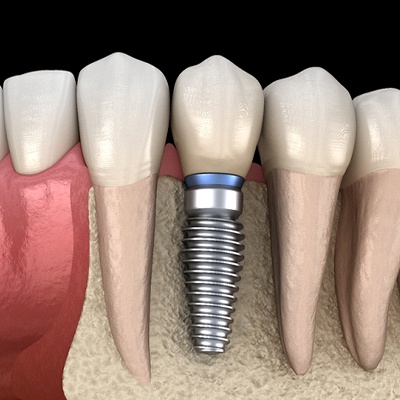
Dental implants are an excellent solution to permanently replace missing teeth. Although you’re excited to enjoy their benefits for yourself, you probably have a few questions about the road ahead. There’s no need to worry. We’ll take the time to explain the process and address any concerns during your initial consultation. While you wait, here are the answers to a few of the most common questions Dr. Tolliver is asked about the procedure.
Can I get dental implants if I have gum disease?
If you have lost teeth from gum disease, you’re not alone. Although the infection is preventable, it’s the leading cause of tooth loss. Unfortunately, you won’t be a candidate for dental implants if you have gum disease, but that doesn’t mean you can’t become one. Periodontal therapy will treat the infection to create the healthy foundation you need for dental implants to thrive.
Will I need bone grafting?
Many patients who are interested in dental implants will need bone grafting to become a candidate for the treatment, but it isn’t always necessary. If you’ve lost density in your jaw, you’ll need the additional procedure to add bone to areas that are weak. Although this creates an extra step in your treatment plan, it’s time well-spent to ensure your jaw can support the posts long-term.
Can dental implants fail?
Dental implants are the most reliable option to treat tooth loss. In fact, they have over a 95% success rate to last for decades. Although it’s rare, they can fail, but the risk is generally less than 5%. Most often it’s caused by an infection called peri-implantitis. You can significantly lower the likeliness for the infection by maintaining your oral hygiene at home and visiting your dentist regularly for a cleaning and checkup.
Do dental implants hurt?
Sedation or anesthesia is used to ensure your comfort during your implant placement surgery, so you won’t feel any pain. It’s normal for there to be some discomfort while you heal, but it will gradually improve each day until it subsides.
If any pain develops after you’ve healed, it is often an indicator of implant failure. It’s best to contact your dentist right away to get to the root cause of the pain. You’ll also want to see your dentist right away if you develop any other concerning symptoms, like the implant feeling loose. Quick action can prevent complete dental implant failure.
Can I use my dental insurance?
Every policy differs, but most plans offer some coverage for dental implants after paying your annual deductible. Although your policy won’t cover the entire amount, it can lower the cost of certain steps in your treatment, like the X-rays or restorations. We will work on your behalf with your insurance carrier to file the necessary claims and forms, so you have one less thing to worry about. We’ll explain how your benefits are being used and your payment options for any remaining balance, like using third-party financing.